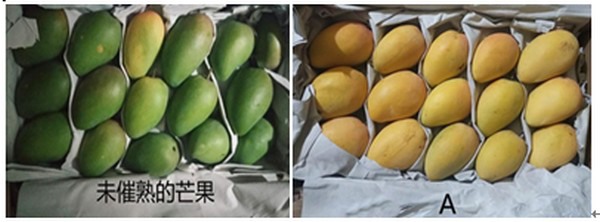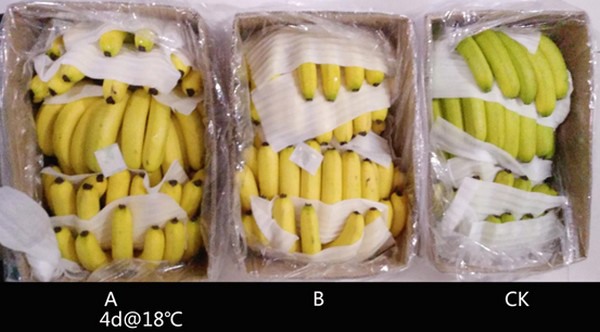The outbreak of Covid-19 has had and still has an important impact on the international market. Fruit and vegetable companies are struggling with the obstacles created by this pandemic. Distribution in particular has become much more difficult this year. Market supply chains are slower and less reliable, which makes timely delivery a problem. Suppliers are unable to guarantee the right degree of freshness and ripeness of the fruit and vegetables they supply.
Manager Wang of Shandong Nutritional Food Science recently addressed this issue and introduced the company's own slow-release ethylene bags. This product is a suitable companion for bananas, mangoes, avocados, papayas, and tomatoes.

Manager Wang first introduced two methods commonly used to promote ripening. "Most companies purchase their products directly from production areas. They then transport the fruit and vegetables to ripening chambers before they are ready to be sold. However, many companies are unable to use this method due to market competition or limited investment capital.
"The second method uses calcium carbide. This method is more popular with smaller companies. However, abuse of calcium carbide can lead to health risks for clients," explained manager Wang. "We have developed a patented slow-release ethylene bag specifically to solve this problem. One box of fruit requires a set number of slow-release ethylene bags that will help the fruit ripen in a short amount of time. Using this product helps avoid the cost of investment in ripening chambers and suppliers can easily adjust the volume of ripe fruit based on market demand. Furthermore, the slow-release ethylene bags are easy to use during transport, leave no residue, and are friendly for the environment."

"The slow-release ethylene bags are extremely useful for bananas and mangoes, two kinds of fruit with large supply volumes and international demand. Bananas and mangoes are late-ripening fruits. In other words, they are relatively unripe when harvested and require ripening before they can be sold. Bananas and mangoes are harvested when they are 80% or 90% ripe to keep the fruit fresh and extend the shelf life. They only ripen completely after transport to the destination market. However, the outbreak of Covid-19 significantly complicated distribution of fruit and vegetables and sales are less certain than before. Suppliers can easily use their ripening chamber to stimulate ripening in a large volume of fruit only to find out that their supply volume exceeds market demand. This means heavy costs and no returns. Slow-release ethylene bags can easily solve this problem. Our products help clients easily adjust the volume of ripe fruit based on accurate data from the market."

Manager Wang briefly explained how to use the slow-release ethylene bags. "The use of this slow-release ethylene bag is extremely simple. The temperature and moisture in the warehouse need to be kept at suitable levels, but other than that, the supplier only needs to add a single slow-release ethylene bag to every plastic-lined banana box. One bag is sufficient for 13-15 kg of bananas or 5 kg of mangoes. The bag will help the fruit ripen in only 3-4 days and then the fruit can be sold in the market."
Shandong Nutritional Food Science Co., Ltd. has worked hard to supply the international market with ripening solutions. "The slow-release ethylene bags have been developed by our company. The bags meet the Chinese GB 9830-88 standards and are already patented. We are currently looking for international partners to authenticate our product in other countries and establish global cooperation."
For more information:
Wang - Manager
Shandong Nutritional Food Science Co., Ltd.
WhatsApp: +86 18615225880
WeChat: +8618615225869
E-mail: [email protected]
Website: www.chinesepost-harvest.com
